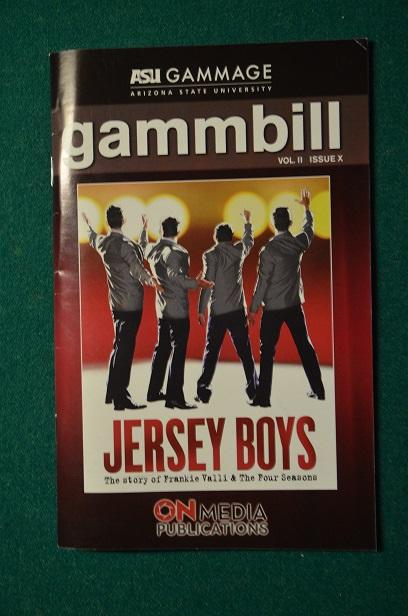A Standing Ovation for “Jersey Boys”
Photo Courtesy of Ryan Deitchman
An in-character cast provided reason for the applause, and most all of the theater-goers thoroughly enjoyed the experience. Classics like The Jersey Boys can be skewed depending on the theater, but ASU Gammage did it justice.
August 10, 2014
You’ve probably seen the movie commercials or have heard word of it floating around, but “Jersey Boys” is a magnificent onstage production. It was at ASU Gammage from July 22 to Aug. 3, and I was lucky enough to see it. The musical is based on the real story of The Four Seasons, Tommy DeVito, Bob Gaudio, Nick Massi, and Frankie Valli, and how they began and then went downhill. In the play, each of the four members narrates their own part of the story by season, beginning with Tommy DeVito and Spring.
Tommy begins with how the band started, and how he took in Frankie Valli, who at the time was just a troublemaker from New Jersey, making him realize that he “has the voice of an angel.” So Frankie joins with Tommy and Nick Massi to start a band but they struggle musically until they’re introduced to singer/songwriter Bob Gaudio. Bob tells about how he joined the band and its success in Summer, Nick explains how the band fell apart in Fall, and lastly, in Winter, Frankie describes what life was like having his own band, Frankie Valli & The Four Seasons, after the original Four Seasons broke up. For the finale, the group members sang one last song and told what happened to them after their performing careers ended.
Each actor was amazingly in character. I felt like they were the real people, not actors, and had to keep reminding myself of that. I loved the look of the sets and how all they changed around was furniture onstage and a screen in the back that labeled the setting or part of the play. (For example, sometimes it would have the name of the nightclub or have the name of a season during a change in narration.) The background was perfect for each scene and there was always a meaning for each piece of blocking, no matter how awkward it seemed at first.
However, the play did sometimes feel vague for people who didn’t live in the ‘60s. I didn’t understand a lot of references to their pop culture or way of living. So, if you plan on seeing it, read up on the decade in which they were popular. Listen to some The Four Seasons’ songs on YouTube and become familiar with them. You’ll appreciate it a lot more when they perform the music. The actors also spoke with thick New Jersey accents, so I couldn’t understand a lot of what they were saying before I got used to it. I also don’t suggest bringing anyone under the age of twelve. The play uses Jersey language, and the wrong child could be uncomfortable or immature about it. But I believe the story and the music makes up for the profanity.
The performance of Jersey Boys that I saw deserved a standing ovation – and it got one. Almost the entire theatre was up clapping and smiling at the work of the actors. For many, it recreated a story that they remembered, but for me, it was a new story that helped me appreciate the music business and the ‘60s more than I ever had.














